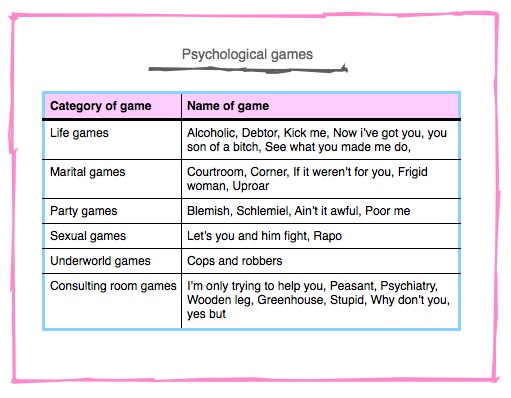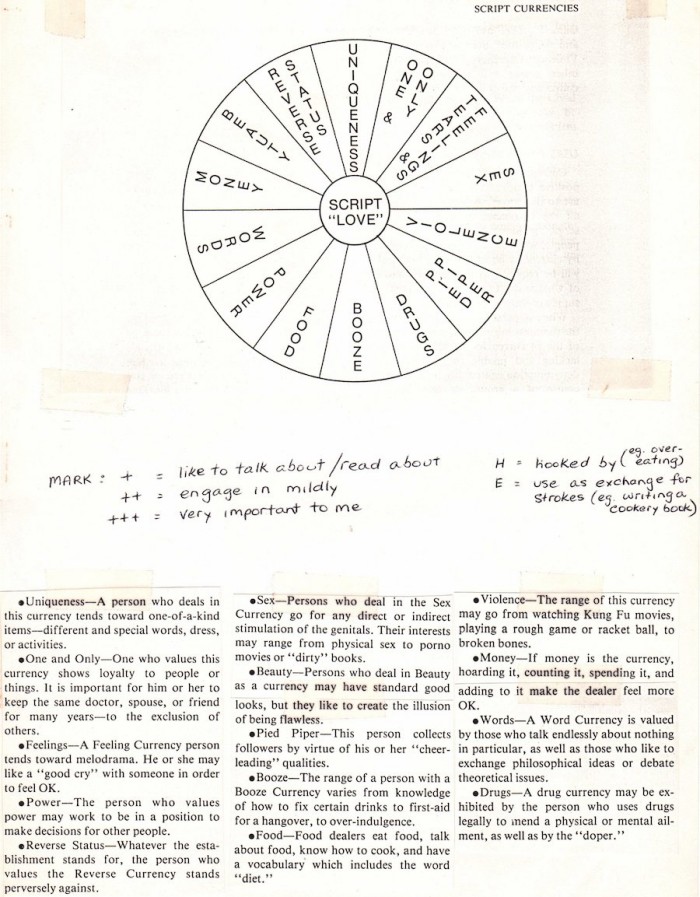A psychological game is a repetitive, unconscious pattern of self destructive behaviour played out in a relationship.
Games have three qualities or aspects to them
1. Flexibility. This refers to game or script currency. Games can be played in many different ways using different currencies. For instance the game of courtroom can be played using money, violence, sex, booze and so forth. Or the game of poor me can use money, beauty, feelings, food, sex and so forth. Kick me may use power, drugs or money. The game of uproar can include pied piper, drugs, sex, feelings and so forth.
Those who are flexible in there game playing can switch between currencies in order to play the same games. Or can play the same game with different people using different currencies. Others are less flexible and will play their games using only one or two currencies. The less flexibility the less ‘gamy’ a person will be.
2. Tenacity. This refers to how easily people will give up their game playing and revert to less ulterior, unconscious and destructive ways of relating to others. The very tenacious are most reluctant to give up their game playing and hence are more self destructive in that sense. Their need to live out their life script using game playing as reinforcement is strong. They are on a path to their final life script outcome and will tenaciously follow that path.
Less tenacious game players are more willing to let their game playing type of behaviour go once they are aware of the games they are playing. Awareness of their unconscious game playing is often enough for them to by and large drop the game from their behaviour. For the tenacious game player awareness alone is not enough. They need to consider their self destructiveness in more depth. Games are used to damage self and one’s relationships in order to finally live out the life script. Tenacious game players need to psychologically deal with these factors more so than the less tenacious game player.
3. Intensity. Games can be played at three different levels.
First degree game – these are socially acceptable and will be played in public. Flirtation as a form of rapo, complaining about work as a form of poor me, Why don’t you yes but can also be played publicly.
Second degree game – in these games there is no permanent damage but people will not play them publicly, instead they are kept behind closed doors. Uproar can involve shouting arguments in a marriage that people would prefer to keep private. The game of cops and robbers can involve games played by breaking the law and people tend to want to keep such matters private. Games using drugs and alcohol can also be seen as embarrassing and people will tend to keep those games private.
Third degree game – in this case there is often permanent damage to the person and their relationships and ends up in the morgue, surgery or the courtroom. The game of uproar can end up in the divorce court. Wooden leg or poor me can end up in surgery and cops and robbers or kick me can end up with death.
Games occur by a process known as Projective identification.
This defence mechanism involves the cooperation of two people in order to be complete. The initiator of the projective identification, projects the unwanted part of self onto the other person. The initiator then acts in such away that will influence the recipient to identify with the projection and then act it out. The recipient then displays the projected behaviour of the initiator. The same then happens in reverse. In essence psychological games require at least two people to unconsciously agree on a pattern of behaviour they will display to each other. They will project onto the other and manipulate each other to behave in a way which allows the game transactions to continue between them.
Game transactions are unique types of transactions because of the projection involved. This allows both parties to be very aware of what the other is feeling and thinking because they know the projection that has been identified with by the other. Indeed they are in essence relating to the projected part of self and thus game playing can be seen to be quite a narcissistic activity. Non game transactions do not usually have the process of projection involved in them.




